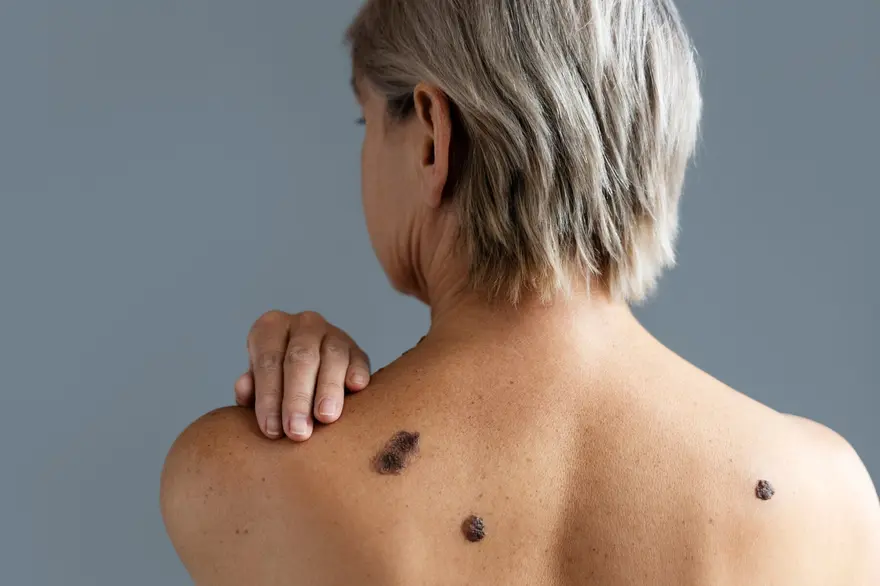Preventive Healthcare
Acanthosis Nigricans: Causes, Symptoms, Diagnosis, and Treatment
361 Views
0

What Is Acanthosis Nigricans?
Have you recently noticed a peculiar darkening skin in certain areas? Perhaps around your neck or under your arms? If yes, you might be witnessing signs of a condition known as acanthosis nigricans. The medical term might seem a little intimidating at first, we are here to explain it in simple terms.
Acanthosis nigricans is a skin condition characterised by dark, thickened patches that feel velvety to the touch. These patches usually appear in body folds and creases, such as the armpits, groin, and back of the neck. It's especially common in people with obesity and can sometimes indicate an underlying health issue like diabetes or, in rare cases, cancer. But don’t worry! With early detection and appropriate treatment, it’s manageable.
Where Does Acanthosis Nigricans Appear?
The unique characteristic of acanthosis nigricans is that it appears on specific parts of the body. Usually, these are areas where your skin folds over itself or rubs together.
Commonly affected areas include:
- Armpits
- Back of the neck
- Groin area
- Elbows
- Knees
- Knuckles
Rarely, it can also develop on the face, palms, soles of feet, or underneath female breasts. It becomes important to monitor these areas closely for any changes in the skin's texture or colour.
Is Acanthosis Nigricans Contagious?
Acanthosis nigricans is not contagious. It cannot be transmitted from one person to another, nor can it be contracted through contact with an affected individual.
Is Acanthosis Nigricans Dangerous?
Acanthosis nigricans itself is not a dangerous or life-threatening condition. However, it can be a warning sign of underlying health issues that require attention.
The severity of acanthosis nigricans depends on the underlying cause:
- Acanthosis nigricans can be associated with cancer, especially gastrointestinal adenocarcinomas or genitourinary cancers, is considered malignant acanthosis nigricans. This type has a rapid onset and is a sign of advanced cancer.
- Sudden or rapid development of acanthosis nigricans may indicate an underlying malignancy and warrants further investigation.
- In rare cases, acanthosis nigricans can occur on mucous membranes like the nose, mouth, esophagus or larynx, which may cause complications.
Who Gets Acanthosis Nigricans?
Acanthosis nigricans affects both men and women equally. It is especially prevalent in people with following risk factors:
- Overweight or obese people
- Diabetics or those with prediabetic conditions
- Individuals with a family history of acanthosis nigricans
Additionally, children who develop this condition have a higher risk of developing type 2 diabetes in the future. Moreover, studies in India have shown significant prevalence among adolescents who are obese or have low physical activity levels.
Does Acanthosis Nigricans Mean I Have Diabetes?
Acanthosis nigricans can be an indicator of insulin resistance, which is often linked with diabetes. Although having acanthosis nigricans does not guarantee a diabetes diagnosis, it is a common warning sign that may require further evaluation. An acanthosis nigricans diagnosis usually involves a physical exam and possibly blood tests to check blood sugar levels and other related issues.
If diabetes or another underlying condition is identified, an appropriate acanthosis nigricans treatment can help manage both skin conditions and any underlying health issue. Addressing root causes, like improving diet and increasing physical activity, can lead to a reduction in the dark patches associated with acanthosis nigricans.
How Common Is Acanthosis Nigricans?
Despite being termed a 'rare disease', studies suggest that acanthosis nigricans is quite common among obese individuals. In fact, at least 50% of adults who weigh double their ideal body weight reportedly show signs of acanthosis nigricans. This reaffirms the strong link between obesity, insulin resistance, and this skin condition.
What Are Symptoms Of Acanthosis Nigricans?
Typical acanthosis nigricans symptoms include:
- Brown or black patches on the skin
- Skin that feels velvety
- The presence of skin tags
- Itchiness
Symptoms typically develop gradually. However, if they appear suddenly, it's crucial to see a dermatologist immediately, as this could indicate cancer.
How Is Acanthosis Nigricans Diagnosed?
Acanthosis nigricans diagnosis is usually based on physical examination and medical history review. Sometimes, blood work or skin biopsy may be required for a confirmed diagnosis.
Will Acanthosis Nigricans Go Away on its Own?
Unfortunately, acanthosis nigricans won't go away on its own. However, addressing the underlying cause often helps restore the skin's normal colour and texture.
Is Acanthosis Nigricans Reversible?
Yes, acanthosis nigricans is reversible with the right treatment! While dark spots may not completely disappear, significant improvement can be observed post-treatment.
What Is The Treatment For Acanthosis Nigricans?
The treatment for acanthosis nigricans primarily focuses on addressing the underlying acanthosis nigricans causes, such as insulin resistance or obesity.
- Effective acanthosis nigricans treatment often involves lifestyle changes, such as weight loss and dietary adjustments, which can enhance insulin sensitivity and may help reduce the skin symptoms.
- Topical treatments can help lighten the dark skin. This includes prescription creams with retinoids, which help in skin exfoliation and dark patches reduction.
- In some cases, dermatologists may recommend laser therapy or chemical peels for cosmetic improvement.
- For those with insulin resistance, medications may be prescribed to help manage blood sugar levels, which can lead to improvements in skin appearance.
While acanthosis nigricans isn’t dangerous, addressing the underlying issue is important for better overall health and can really improve quality of life for affected individuals.
How Can I Manage Acanthosis Nigricans?
Managing acanthosis nigricans involves addressing elevated insulin levels if they are causative factors. This usually means adopting healthy lifestyle like maintaining a healthy weight and following a balanced diet.
Can Acanthosis Nigricans Be Prevented?
In cases where obesity is causing acanthosis nigricans, prevention is possible through weight management. Following a diet that regulates blood sugar levels can also aid in preventing this condition.
What Is the Outlook for People with Acanthosis Nigricans?
While the presence of acanthosis nigricans itself isn’t dangerous, it indicates a need for lifestyle changes or medical intervention to manage underlying conditions like diabetes or obesity. With proper care and management, individuals can still continue to live a normal, healthy lives despite having acanthosis nigricans.
When Should I See a Dermatologist About Acanthosis Nigricans?
You should consult a dermatologist as soon as you notice any changes in your skin texture or color. Remember, early detection is key to managing acanthosis nigricans effectively!
Conclusion
Taking charge of your health starts with understanding your body and recognising when something feels off. If you notice any signs of acanthosis nigricans, don't panic. Instead, consult your doctor, and take it as a cue to reassess your lifestyle choices and health habits.
At Metropolis Healthcare, we are committed to empowering you with the knowledge and diagnostic services necessary for a confident healthcare journey. With our network of advanced diagnostic labs and convenient at-home sample collection provides a seamless experience for our patients. Choose Metropolis for reliable, accurate pathology testing and comprehensive health check-up services. Your health deserves the best!
 Home Visit
Home Visit Upload
Upload














1701259759.webp)









 WhatsApp
WhatsApp